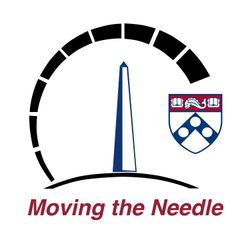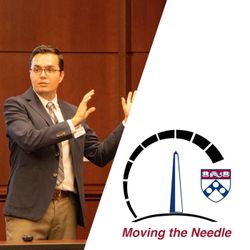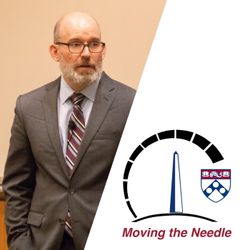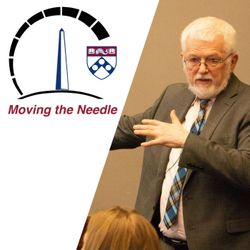Share

Moving the Needle
Turn up the volume on data-driven business and economic research by faculty affiliated with the Wharton Public Policy Initiative
Latest episode

How Does Immigration Affect the Economy? An Evidence-Based Discussion
21:12|Immigration is one of the most relevant issues of our time. One of the most important questions is whether immigrants are helpful or hurtful to the economy. This interview with Professor Zeke Hernandez provides an overview of his research exploring how immigrants affect capital investment, innovation, and economic growth, and what the evidence implies for setting immigration policy.
More episodes
View all episodes

Binyamin Appelbaum on his new book, The Economists' Hour
23:39|The Wharton Public Policy Initiative hosted Binyamin Appelbaum for a talk on his newly released book, The Economists’ Hour: False Prophets, Free Markets, and the Fracture of Society. Appelbaum is a member of the New York Times Editorial Board and his book traces the history of the US economists’ growing influence in the policy sphere. He met with Dan Loney in the Knowledge@Wharton Business Radio studio to talk about his book.
Inequality in the Gig Economy
20:40|Gig economy jobs have soared in recent years, but as the consumer receives a quick service or a same-day delivery product, what are the workers getting? When this type of work, including ride-hailing services and ice cream delivery came along, some thought women would benefit greatly. But data shows that this hasn't occurred yet, as inequality is a growing component of the global workforce. There has been an "Uberization" of what the gig economy is today, and those jobs are mainly done by men which has left the discussion about women in this sector primarily on the side. Professor Julia Ticona joined host Dan Loney in the Knowledge@Wharton Business Radio studio to discuss her research into the inequalities of the gig economy.
How The Law Can Help Protect Consumers When Making Large Financial Decisions
24:52|Richard Cordray, was the first Director of the Consumer Financial Protection Bureau, which was formed in the wake of the Great Recession as part of the Dodd-Frank Wall Street Reform and Consumer Protection Act. In his five years leading the CFPB, Cordray was tasked with making sure consumers were no longer harmed by the actions of banks, lenders, and other financial institutions. In 2017, Cordray returned to his home state of Ohio where he had previously served as State Treasurer and Attorney General, to run for governor. Mr. Cordray was the Wharton PPI 2019 Public Policy Visiting Fellow and joined Dan Loney in the studio for a special interview.
Antitrust in the Labor Markets
27:10|Big U.S. tech companies like Apple, Alphabet, Facebook, and others, are coming under fire for being monopolies that should be broken up. This is what we have been hearing from Democratic Presidential candidates like Massachusetts Senator Elizabeth Warren and Minnesota Senator Amy Klobuchar. It is an idea that is gaining steam as these tech giants face accusations of violating privacy rights, squeezing out competitors, and spreading misinformation. A new 150-page report commissioned by the British government includes many of those similar criticisms and say the existing rules governing these companies are outdated and need to be strengthened. And the European Union has repeatedly fined big tech companies. So is it time for the U.S. to look at whether the tech industry is too big and make some changes?
Nation Branding: Which Countries Ranked Highest This Year?
24:11|The idea of brand identity extends beyond the corporate world. Countries are also brands, and a country’s brand, like a corporate brand, is economically powerful. A positive country brand brings money and economic growth to it through tourism, foreign direct investment, and foreign trade; conversely, a negative country brand is economically costly. Professor David Reibstein, who collaborates with U.S. News and World Report in developing the Best Countries Rankings, shares select insights from his research.
The Economics of Universal Basic Income
24:00|The idea of a universal basic income (UBI) has generated a lot of conversation. The conversation in the U.S. often has focused on whether a UBI program here would be politically palatable and feasible. Its economic implications, however, are not always well understood. Based on her B-School seminar, Professor Marinescu discusses her research on UBI-style programs, such as the Alaska Permanent Fund, to discuss their effects, especially with regard to labor markets.